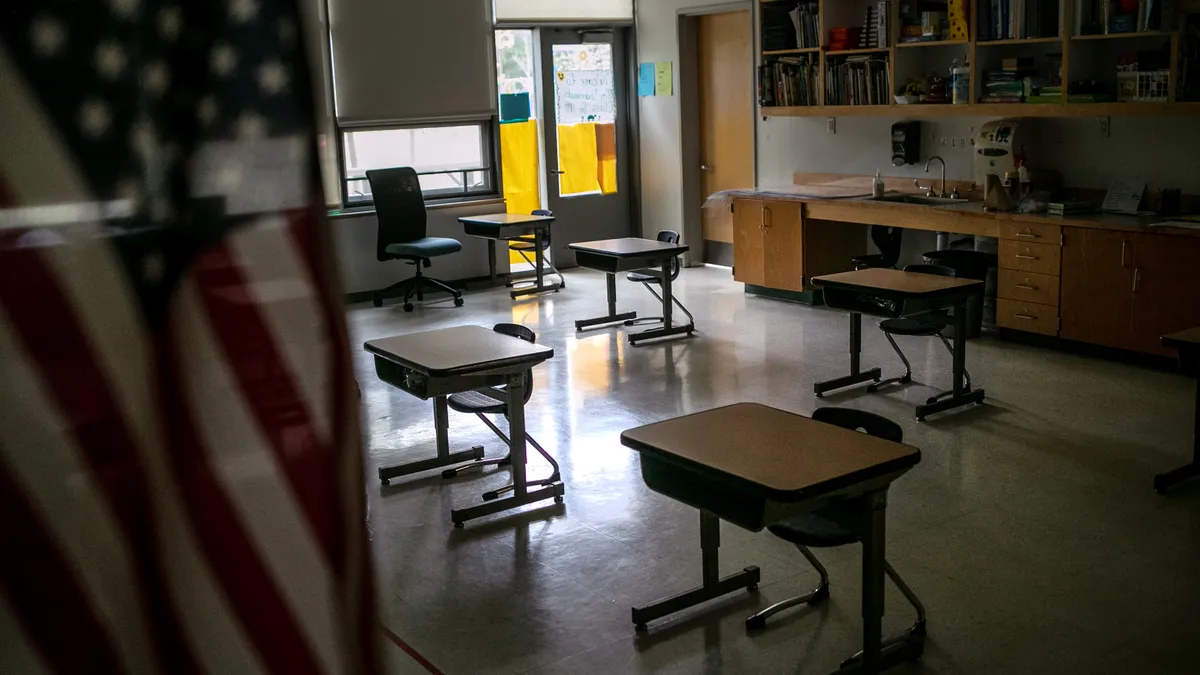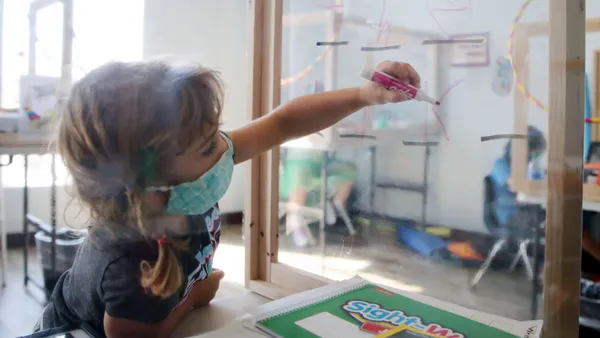Dive Brief:
- Growing political conflict is harming efforts at respectful dialogue in schools and causing barriers in addressing misinformation, according to a report released Wednesday. The report is based on a survey of nearly 700 high school principals conducted by the Institute for Democracy, Education, and Access at the University of California Los Angeles and the Civic Engagement Research Group at the University of California Riverside.
- School principals in politically divided communities were more likely than those in liberal or conservative areas to report acute levels of community conflict on many measures. Those actions include parental challenges to media sources or information used by teachers, as well as students making derogatory comments to liberal or conservative classmates.
- While respectful political conflict in schools is welcomed, the harassment and demeaning rhetoric school leaders are reporting threatens to interfere with education's mission to encourage a diverse democracy where people of many viewpoints come together to debate and resolve common problems, said co-author John Rogers, a professor of education at UCLA and director of the Institute for Democracy, Education and Access.
Dive Insight:
The report's researchers correlated the surveyed principals with their school's congressional districts and the 2020 presidential election results to understand their areas' political leaning and to better understand conflict patterns playing out in schools in blue, purple or red communities.
In this study, blue communities are where Donald Trump won less than 45% of votes, purple communities represent areas where Trump got 45% to 54.9% of votes, and red communities are where he garnered 55% or more of votes.
For example, researchers found that principals in purple communities — where partisanship is nearly evenly split — were more likely to report multiple occasions of students making demeaning or hateful remarks toward classmates for expressing either liberal or conservative views.
Additionally, principals in purple communities were more likely than principals in red or blue communities to report multiple instances of students rejecting information sources used by their teachers or making unfounded claims in class based on unreliable media sources.
Other findings include:
- More than half of the principals in purple communities (63%) and nearly half of all principals (48%) said parents or other members of their school communities “sought to limit or challenge … teaching and learning about issues of race and racism” during the 2021-22 school year.
- Almost a quarter (23%) of principals in purple communities said their school board or district leaders took action to limit teaching and learning about race and racism, compared to 17% of principals in red communities and 8% in blue communities.
- Principals in all schools reported multiple incidents of students making hostile or demeaning remarks toward LGBTQ+ classmates in 2022. Principals in purple communities, however, had the highest rates, at 32%, compared to 22% in both red and blue communities.
- Opposition to social-emotional instruction was most prominent in purple areas, with 28% of principals in those communities reporting multiple occasions when challenges occurred, compared to 17% in blue communities and 15% in red communities.
A similar principal survey in 2018 did not show such partisan divides, the report said. For instance, both purple and red communities showed a significant decline between 2018 and 2022 in support for teachers to educate about diversity.
Hyperpartisan politics and the targeting of schools by conservative and right-wing groups have contributed to the growing partisan divides, Rogers said.
Differences in opinions and debate are healthy, he said, but they need to be done with dignity and respect and include opportunities for people of diverse experiences to come together.
School administrators can model this by advocating for democracy and civic instruction, as well as participating in efforts outside of school to improve their communities, according to Rogers.
Rogers also emphasized that the study does not imply that parental involvement is harmful. In fact, Rogers said it should be strongly encouraged. However, that involvement can be problematic when it is threatening or contributes to the spread of misinformation.
"We need to figure out how to work together for the benefit of all, and when small groups are engaging in threatening antidemocratic activity when they're spreading misinformation, that undercuts the ability of public schools to play that role," Rogers said.
"Our concern is … certain forces are making it harder to enact this diverse democracy and to enact it in public schools.”












